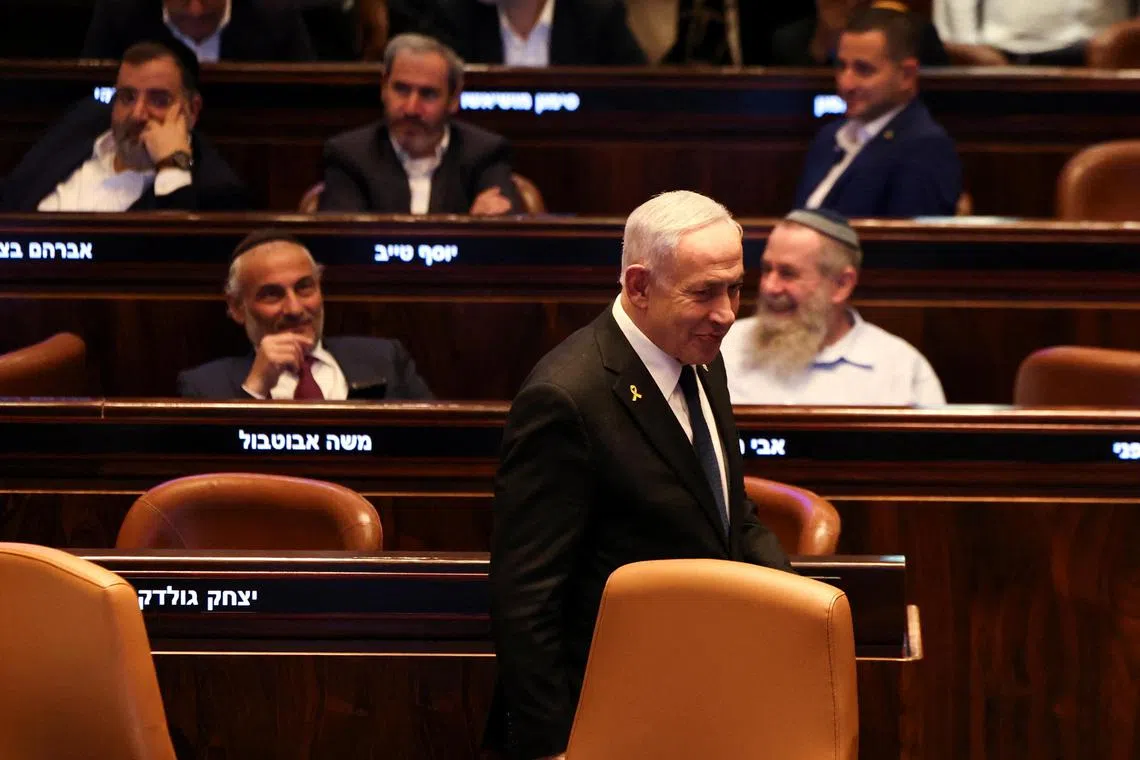Second ultra-Orthodox party quits Israel Cabinet, but throws Netanyahu a lifeline
Sign up now: Get ST's newsletters delivered to your inbox

Israeli Prime Minister Benjamin Netanyahu walking in the Knesset, Israel's Parliament, on July 14.
PHOTO: REUTERS
- Shas party withdrew ministers from Netanyahu's cabinet due to a dispute over military conscription for ultra-Orthodox seminary students.
- The withdrawal doesn't threaten early elections or ceasefire efforts, as Shas will still back the coalition in Parliament.
- Internal divisions exist, with ultra-Orthodox parties focused on conscription and far-right parties opposing Gaza ceasefire concessions.
AI generated
JERUSALEM - A second ultra-Orthodox party quit Prime Minister Benjamin Netanyahu’s Cabinet on July 16, but said it would remain within his coalition for now, giving the government more time to resolve a thorny dispute over military conscription.
A day earlier, the ultra-Orthodox United Torah Judaism (UTJ) party abandoned the coalition
But rather than follow suit, the ultra-Orthodox Shas party said on July 16 it would just pull its ministers from government ranks while continuing to back the coalition in Parliament.
“Shas representatives... find with a heavy heart that they cannot stay in the government and be a part of it,” the group said in a statement, a day after the UTJ party announced its full walkout.
The Shas decision means Mr Netanyahu does not face the threat of early elections - for now - nor does it undermine his efforts to secure a possible Gaza ceasefire.
Israel’s Parliament starts a three-month summer recess on July 27, giving Mr Netanyahu time to try to resolve the problem of who should serve in the military
There was no immediate comment from Mr Netanyahu or other partners within his increasingly splintered Cabinet.
While the ultra-Orthodox parties have focused their anger on the conscription issue, far-right parties have been pressing Mr Netanyahu not to make concessions in ceasefire talks with Hamas militants that are under way in Qatar.
National Security Minister Itamar Ben-Gvir and Finance Minister Bezalel Smotrich want Israel to press on with the war, but Mr Netanyahu would still be likely to have enough Cabinet votes to back any eventual ceasefire without them.
War weary
Underscoring divisions in the coalition, Shas in its statement on July 16 urged Mr Netanyahu to do “everything in his power” to reach a deal with Hamas.
Israelis have become increasingly weary of the 21-month war in Gaza, which began with Israel’s single deadliest day on Oct 7, 2023, when a surprise attack by Hamas
Israel’s subsequent offensive against Hamas has killed more than 58,000 Palestinians, according to health officials, displaced almost the entire population of Gaza, led to a humanitarian crisis
It has also exacted Israel’s highest military death toll in decades, with around 450 soldiers killed so far in Gaza combat.
This has added fuel to an already explosive debate over a new conscription Bill that lies at the centre of the latest crisis to rattle Mr Netanyahu’s coalition, which took office in late 2022 and is due to stay in office until the autumn of 2026.
Ultra-Orthodox seminary students have long been exempt from mandatory military service. Many Israelis are angered by what they see as an unfair burden carried by the mainstream who serve.
Ultra-Orthodox Jewish leaders say full-time devotion to the study of holy scriptures is sacrosanct and fear their young men will steer away from religious life if they are drafted into the military.
In 2024. the Supreme Court ordered an end to the exemption. Parliament has been trying to work out a new conscription Bill, which has so far failed to meet UTJ demands. REUTERS


